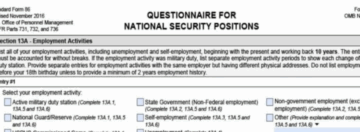Deferred Sentence vs. Conviction

There was a lively and informative conversation on a recent ClearanceJobs Blog posting when a security clearance applicant asked for advice on whether they needed to report a domestic violence arrest where the judge deferred sentencing as part of a plea agreement by the defendant. Let’s take a look at what deferred sentencing actually means. In most states a judge has the authority to dismiss charges if the defendant pleads guilty and agrees to complete the terms of the court. This could mean completing classes, community service, or just remaining trouble free for a certain period of time. The last one is also considered a form of probation. In this case, the defendant pleaded guilty to the domestic violence charge and subsequently completed all the terms of the court conditions. The charge was then dismissed and under that state law, is considered as not a conviction.
This is tricky for security clearance applicants when answering the questions on the Questionnaire for National Security Positions (SF-86). As a few of the background investigators noted on the blog post, it is better to disclose the arrest and deferred sentencing up front and explain what happened. This prevents the appearance of hiding information, which would lead to the perception of a lack of candor. Even if technically the applicant was correct in the way they answered, full disclosure is always better. Additionally, the adjudicator who reviews the completed background investigation looks at the behavior that led to the arrest, not necessarily the final court disposition where an attorney may get the charge pled down or even thrown out on a technicality. An example of this is someone who gets arrested four times for assault but may have no convictions because the witness refuses to testify. The likelihood that the behavior occured is high and will be taken into account in the final determination.



You mean to tell me that a judge cannot remand you for holding without a conviction? You need a conviction for a judge to issue a warrant for your arrest? How about issue an order of protection? Do you need a conviction first for one of those? Need a conviction before a judge orders you to wear an ankle monitor pending trial? Ever seen a subpoena? No conviction required for one of those! A a judge CAN literally make you do MANY THINGS without a conviction, period. Look at those consequences! No conviction needed!
How about the literal definitions of the words ‘deferred’ and ‘adjudication?’ The entire point of this is for courts to not adjudicate., much less convict then go back and overturn their conviction. If the defendant does not meet the requirements of the deferred adjudication, then the case is adjudicated with the most likely outcome of conviction.
All you have to do is google conviction vs. deferred adjudication, easy peasy, no master’s degree required!
You really need a better understanding of our court system.
lol
We are talking about a criminal proceeding here but that’s fine, you want to mix apples and oranges, I will delete my comment. It’s not worth arguing. Y’all can put whatever you want on your paperwork and it can be seen as a honesty issue all day long. Not my circus, not my monkeys.
Nobody really truly understands with complete and total comprehension our living and evolving “court system” Interpretations and understandings are all over the place and that’s probably a good thing. There’s a reason law school is so long and so expensive, the bar is hard to pass and firm decisions from decades ago can be overturned. The SF86 is similar in many of it’s phrasing and nuances. If we really want to argue about confusing documents…let’s talk about the IRS tax code…there’s something just about no one understands in complete and total accuracy. That appears to be why it’s so easy to manipulate
You should not have deleted it. You were correct in what you said.